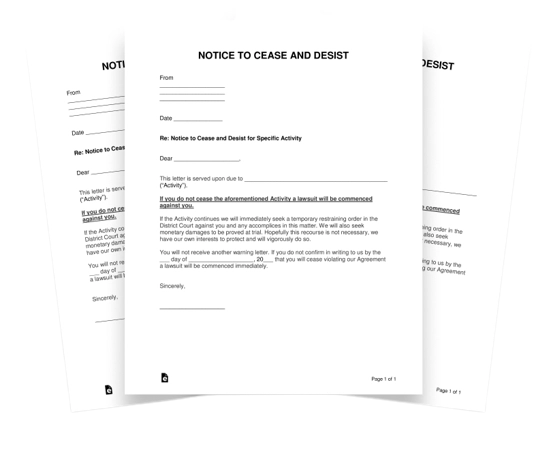Get the Best Cease and Desist Assistance
from some of the leading and experienced lawyers in Sydney

Download a free Cease
and Desist letter template
Created and approved by the experts at CMI Group for your use.

Download a free Cease
and Desist letter template
Created and approved by the experts at CMI Group for your use.
A cease and desist letter is a formal written request to halt a particular behaviour by an individual or organization. These letters are frequently used to address legal matters such as the violation of rights related to inventions, symbols, and designs, defamation, and harassment. CMI Group has a team of experienced Sydney lawyers specializing in cease and desist order, with an experienced grasp of the function of these letters under Australian law and the procedure for creating and sending one. If you are wondering if Desist letter enforceable, then it is important to note that a cease and desist order is not enforceable in and of itself; if the offending party does not comply with the request, you may need to take further legal step. In this article, we will cover the legal basis for cease and desist order, the types of concerns they might address, and best practices for employing them effectively
Get a Cease and Desist template created by CMI’s expert Cease and Desist Lawyers.
Need Help?
Got an issue you want to talk
to a legal professional about?
Get a free consultation.
*Free consultation is limited to 15 minute
phone call for us to give preliminary advice
It is essential, while writing such a letter, to identify the legal power at hand and collect evidence to support the request. This may involve the collection of contracts, emails, and other pertinent data.
After the letter has been written, it is essential to examine its tone and recipient. The letter should be formal and courteous, and addressed to the proper individual or organization.
Free 15-minute consultation for cease and desist matters
with our experienced lawyers.
Detailed typed rights for legal proceeding:
Legal proceedings are a formal way of resolving disputes between individuals or organizations. There are various types of rights that may be pursued, such as property rights, defamation rights, and harassment rights. If a party does not comply with a request to stop engaging in illegal activity, it may be necessary to take further cease and desist order.
It refers to mental creations such as inventions, literary and creative works, and commercially utilized symbols, names, and pictures. There are multiple laws in Australia that protect inventions, symbols, and designs, including the Copyright Act of 1968, the Trade Marks Act of 1995, and the Patents Act of 1990.
If you believe your legal rights regarding an invention, symbol, or design have been violated, you may want to write a cease and desist written notice to the offending party. The letter should identify the specific rights that have been violated, such as trademark infringement, and demand that the infringing action cease immediately. If the party does not comply, you may need to take further steps, such as requesting damages or a legally binding desist order.
If you live in Sydney and are considering sending a cease and desist letter for a violation of your rights, such as copyright infringement, regarding an invention, symbol, or design, you should consult a knowledgeable Intellectual Property Lawyer. The team at CMI Legal has extensive knowledge of this law, including issues related to copyright infringement, Copyright protection. Expert Copyright lawyers can help you create and send such a letter.
A letter demanding that someone stop making defamatory statements against another party may be given to a person or organization. Legally speaking, defamation is the act of making a false statement about another person that damages their reputation. For a statement to constitute defamation, it must be published or communicated to a third person.
If you suspect that you have been defamed, you may decide to send a letter to the offending party requesting that they stop making the defamatory remarks. The letter should detail the specific statements that have been made and demand an immediate end to the practice. If the party does not comply, you may need to take additional legal steps, such as initiating legal proceedings for damages or a desist order.
If you live in Sydney and are considering initiating legal proceedings for defamation, you should consult an experienced attorney. The defamation law experts at CMI Legal law firm in Sydney can help you create and send a letter due to their extensive knowledge in the field.
A letter demanding that someone stop engaging in illegal or harmful activity, such as harassing another party in person or online, may be addressed to a person or organization. Harassment is the legal term for conduct that is meant to intimidate, annoy, or scare another individual. Multiple Australian statutes prohibit harassment, including the Crimes Act of 1900 and the Anti-Discrimination Act of 1977.
If you believe you have been the victim of illegal or harmful activity, you may want to send a letter to the offender requesting that they stop. The letter should detail the specific incidents of illegal or harmful behavior, such as harassment in the workplace, and demand that it stop immediately. If the party does not comply, you may need to take further action, such as seeking an employment law desist order or filing a police report.
It is important to note that employment law in Australia prohibits certain types of behavior in the workplace, including harassment and discrimination. If you are experiencing these issues, you may want to consider seeking the advice of an attorney who specializes in employment law. They can help you understand your rights and options for addressing the situation.
If you live in Sydney and are considering sending a desist letter in Australia to address illegal or harmful behavior, you should consult a knowledgeable attorney. The team at CMI Group Lawyers has significant knowledge of employment laws and can help you create and send a desist notice.
A letter demanding that a debt collector or creditor stop contacting an individual in an effort to collect a debt may be issued. There are strict regulations limiting the behavior of debt collectors in Australia, including the types of permitted communication and the hours during which they may contact a debtor.
If you suspect a debt collector or creditor is harassing you or engaged in illegal activity, you may want to send a letter requesting that they stop. The letter should include the specific instances of harassment or illegal conduct and demand an immediate end to the behavior. If the party does not cooperate, you may need to pursue additional legal steps, such as initiating legal proceedings for damages or filing a formal complaint with the Australian Financial Complaints Authority.
It is important to note that sending a letter does not cancel or discharge the debt. If you are unable to pay the debt, you should negotiate a repayment plan with the creditor or consult a financial advisor.
If you live in Sydney and are considering initiating legal proceedings for debt collection, you should consult a knowledgeable attorney. CMI Group Lawyers’ staff has extensive knowledge in debt collection law and can help you create and send such a letter.
If you believe you have been the victim of illegal or harmful activity, you may want to send a letter to the offender requesting that they stop. The letter should detail the specific incidents of illegal or harmful behavior, such as harassment in the workplace, and demand that it stop immediately. If the party does not comply, you may need to take further action, such as seeking an employment law desist order or filing a police report.
It is important to note that employment law in Australia prohibits certain types of behavior in the workplace, including harassment and discrimination. If you are experiencing these issues, you may want to consider seeking the advice of an attorney who specializes in employment law. They can help you understand your rights and options for addressing the situation.
If you live in Sydney and are considering sending a desist letter in Australia to address illegal or harmful behavior, you should consult a knowledgeable attorney. The team at CMI Group Lawyers has significant knowledge of employment laws and can help you create and send a desist notice.
A cease and desist letter can be used to urge that a person or organisation stop sending spam or unsolicited emails to another party. Spam refers to unsolicited emails sent in volume, typically for advertising or phishing purposes. The Spam Act 2003 outlaws the transmission of unwanted commercial electronic messages in Australia.
If you are receiving spam or unsolicited emails, you may want to send a letter to the party responsible requesting that they stop. The letter should detail specific examples of spam or unsolicited email and demand that the practice cease immediately. If the party does not comply with your request, you may need to take additional legal procedures, such as notifying the Australian Communications and Media Authority.
If you live in Sydney and are considering sending a letter for spam or unsolicited emails, you should consult a knowledgeable attorney and you can search for a free cease-and-desist letter template. The team at CMI Group Lawyers has extensive knowledge of spam and privacy legislation and can help you create and send such a letter.
If you suspect a debt collector or creditor is harassing you or engaged in illegal activity, you may want to send a letter requesting that they stop. The letter should include the specific instances of harassment or illegal conduct and demand an immediate end to the behavior. If the party does not cooperate, you may need to pursue additional legal steps, such as initiating legal proceedings for damages or filing a formal complaint with the Australian Financial Complaints Authority.
It is important to note that sending a letter does not cancel or discharge the debt. If you are unable to pay the debt, you should negotiate a repayment plan with the creditor or consult a financial advisor.
If you live in Sydney and are considering initiating legal proceedings for debt collection, you should consult a knowledgeable attorney. CMI Group Lawyers’ staff has extensive knowledge in debt collection law and can help you create and send such a letter.
If you believe you have been the victim of illegal or harmful activity, you may want to send a letter to the offender requesting that they stop. The letter should detail the specific incidents of illegal or harmful behavior, such as harassment in the workplace, and demand that it stop immediately. If the party does not comply, you may need to take further action, such as seeking an employment law desist order or filing a police report.
It is important to note that employment law in Australia prohibits certain types of behavior in the workplace, including harassment and discrimination. If you are experiencing these issues, you may want to consider seeking the advice of an attorney who specializes in employment law. They can help you understand your rights and options for addressing the situation.
If you live in Sydney and are considering sending a desist letter in Australia to address illegal or harmful behavior, you should consult a knowledgeable attorney. The team at CMI Group Lawyers has significant knowledge of employment laws and can help you create and send a desist notice.
Unauthorized use of a resemblance: A cease and desist letter may be addressed to a person or organisation requesting that they stop utilising the likeness of another party without their authorisation. Similarity relates to a person’s physical characteristics, such as their face, voice, and mannerisms.
The unauthorised use of another person’s likeness is widely regarded as a violation of their right to privacy in Australia. You may decide to write a desist order to the guilty party if you believe that your likeness has been utilised without your permission. The letter should describe the specific instances of unlawful use of the likeness and demand that the conduct cease immediately. If the party does not comply, you may be required to take additional legal steps, such as requesting damages or cease and desist order.
It is important to note that failing to comply with a cease and desist order can have legal consequences. If the offending party does not stop the behavior in question, you may need to pursue further legal action to protect your rights.
If you reside in Sydney and are contemplating issuing a cease and desist letter for the unlawful use of a likeness, you should consult a knowledgeable attorney. The team of privacy law experts at CMI Group Lawyers will help you create and send a cease and desist letter. Also, they have expert trademark lawyers for issues related to trademarks.
A cease and desist letter can be used to request that a person or organisation stop infringing the privacy of another party. Invasion of privacy refers to any unauthorised intrusion into the private affairs of another individual, such as eavesdropping, obtaining their personal information, or intercepting their communications. Numerous Australian laws restrict invasions of privacy, notably the Privacy Act of 1988 and the Surveillance Devices Act of 2007. If you believe your privacy has been compromised, you may need to move for court proceedings to submit a cease and desist letter to the offending party. The letter should detail the specific instances of privacy breach and demand an immediate halt to the conduct. If the party does not cooperate, you may be required to take additional formal legal action, such as seeking damages or filing a complaint with the Office of the Australian Information Commissioner.
If you reside in Sydney and are contemplating submitting a cease and desist letter for privacy invasion, you should consult a knowledgeable attorney. The team of privacy law experts at CMI Group Lawyers will help you create and send a cease and desist letter.
The unauthorised use of another person’s likeness is widely regarded as a violation of their right to privacy in Australia. You may decide to write a desist order to the guilty party if you believe that your likeness has been utilised without your permission. The letter should describe the specific instances of unlawful use of the likeness and demand that the conduct cease immediately. If the party does not comply, you may be required to take additional legal steps, such as requesting damages or cease and desist order.
It is important to note that failing to comply with a cease and desist order can have legal consequences. If the offending party does not stop the behavior in question, you may need to pursue further legal action to protect your rights.
If you reside in Sydney and are contemplating issuing a cease and desist letter for the unlawful use of a likeness, you should consult a knowledgeable attorney. The team of privacy law experts at CMI Group Lawyers will help you create and send a cease and desist letter. Also, they have expert trademark lawyers for issues related to trademarks.
The unauthorised use of another person’s likeness is widely regarded as a violation of their right to privacy in Australia. You may decide to write a desist order to the guilty party if you believe that your likeness has been utilised without your permission. The letter should describe the specific instances of unlawful use of the likeness and demand that the conduct cease immediately. If the party does not comply, you may be required to take additional legal steps, such as requesting damages or cease and desist order.
It is important to note that failing to comply with a cease and desist order can have legal consequences. If the offending party does not stop the behavior in question, you may need to pursue further legal action to protect your rights.
If you reside in Sydney and are contemplating issuing a cease and desist letter for the unlawful use of a likeness, you should consult a knowledgeable attorney. The team of privacy law experts at CMI Group Lawyers will help you create and send a cease and desist letter. Also, they have expert trademark lawyers for issues related to trademarks.
A cease and desist letter may be given to a person or organization requesting that they stop using the personal information of a third party without their authorization. The term “personal information” refers to any information that can be used to identify an individual, such as their name, address, phone number, and financial details. The Privacy Act of 1988 regulates the acquisition, use, and disclosure of personal information by organizations in Australia.
You may decide to send a desist order to the responsible party if you suspect that your personal information has been utilized without your permission. The letter should include the specific instances of unlawful use of personal information and demand an immediate halt to the behavior. If the party does not cooperate, you may be required to take additional legal action, such as seeking damages or filing a complaint with the Office of the Australian Information Commissioner.
If you reside in Sydney and are contemplating submitting a cease and desist letter for privacy invasion, you should consult a knowledgeable attorney. The team of privacy law experts at CMI Group Lawyers will help you create and send a cease and desist letter.
The unauthorised use of another person’s likeness is widely regarded as a violation of their right to privacy in Australia. You may decide to write a desist order to the guilty party if you believe that your likeness has been utilised without your permission. The letter should describe the specific instances of unlawful use of the likeness and demand that the conduct cease immediately. If the party does not comply, you may be required to take additional legal steps, such as requesting damages or cease and desist order.
It is important to note that failing to comply with a cease and desist order can have legal consequences. If the offending party does not stop the behavior in question, you may need to pursue further legal action to protect your rights.
If you reside in Sydney and are contemplating issuing a cease and desist letter for the unlawful use of a likeness, you should consult a knowledgeable attorney. The team of privacy law experts at CMI Group Lawyers will help you create and send a cease and desist letter. Also, they have expert trademark lawyers for issues related to trademarks.
Got An Issue You Want To Chat To A Legal Professional?
*Free consultation is limited to 15 minute phone call for us to give preliminary advice






